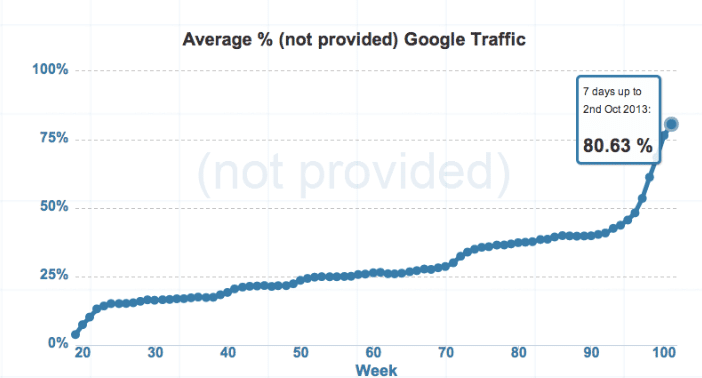Last month, Google made a pretty significant change. From now on, all searches will be secure, even for users who aren’t signed in. All searches, that is, except for ad clicks. Google reports that the move was made to protect the privacy of users, possibly as an NSA-pushback. Some raise the question of whether they might be trying to boost their ad sales. Or maybe, it’s both.
What is Encrypted Search?
Google first started encrypting searches for logged-in users in late 2011. The search giant said they were concerned with the privacy of users, and aimed to prevent anyone from listening in on searches made by an individual. They also prevented the search terms from being visible to publishers.
When a search is secure, the search term is withheld both from providers and Google Analytics users. Instead, the term “Not Provided” appears.
In the chart below (from Not Provided Count), you can see the sudden upswing of encrypted search, after a steady rise, starting the last week of September. What happened?
Encryption for Everyone
Suddenly, this secure search setting has been made the default for anyone who goes to Google and types in a search term. Yes, even those who aren’t logged in. Last month, Google confirmed that they’d made the change: “We added SSL encryption for our signed-in search users in 2011, as well as searches from the Chrome omnibox earlier this year. We’re now working to bring this extra protection to more users who are not signed in.”
They gave no more detail than this, and we’re left with more questions than answers. So why did they make the sudden change?
NSA Push-Back, or Grab for Ad Revenue?
Google has been vehement and vocal about their opposition to government requests for private information. For the last few months, they have been fighting to be allowed to share information about spying requests, and has amped up their encryption between in-house data centers. But there’s another powerful motivator.
In the past, non-advertising (that is to say, non-paying) users had access to a wealth of search information, including keywords, via Google’s Webmaster Tools. That information will now be severely limited; only the top 2,000 search terms per day will be available, a drop in the bucket for Google’s daily traffic.
But here’s the rub- Google AdWords users (paying advertisers) will still have access to everything, as long as they remain paying customers. Apparently, Google’s concerns for user privacy doesn’t go that far.
Google insists that “the motivation here is not to drive the ads side- it’s for our search users.”
How to Cope?
Naturally, Google’s encryption of search is going to affect SEO campaigns which were relying on organic search, and not paid AdWords. Information including the keywords people are using to find you and the conversions and bounce rates for those keywords will be unavailable through Google Webmaster Tools. So what can you and your SEO company do to keep your site optimized without resorting to guesswork?
1. Third-Party Analytics: Google Webmaster Tools is still helpful, and you can even save a list of some keywords as long as you archive it regularly- Google deletes it after 90 days. And while Google is the biggest search provider (at least up until now, that is), they aren’t the only one. By using a third-party analytics provider in conjunction with Google Webmaster Tools, you can put together a pretty comprehensive picture of your search data.
2. Page-Level Analytics: Google won’t be sharing the keywords people searched to find you, but you’ll still be able to see how much traffic and other activity each page gets from search. This information can help you measure visitor engagement page-by-page and determine what your potential customers are looking for.
3. Internal Analytics: If your website has internal search, you can look at that data to piece together more information about what your visitors are interested in.
It seems like we can rely on Google to throw a wrench in the system on a pretty regular basis, but it’s nothing we’re not used to. The SEO game is all about adapting to new standards as we keep serving our customers.









